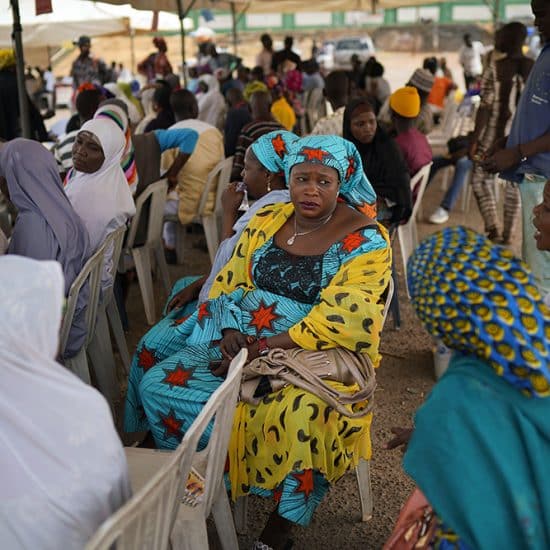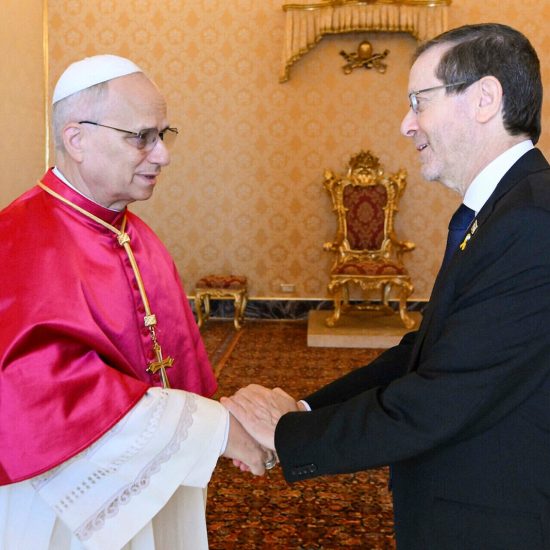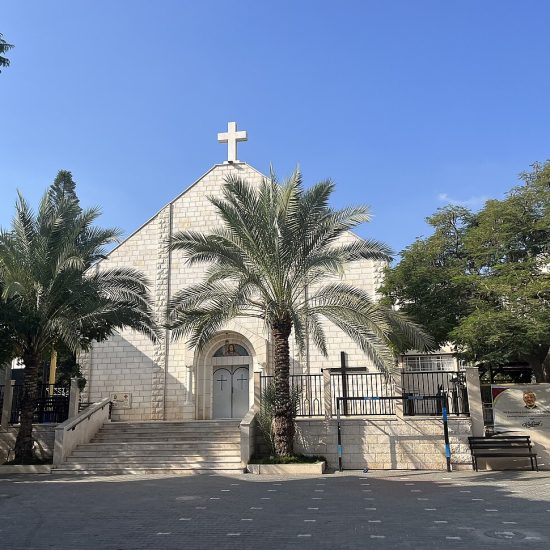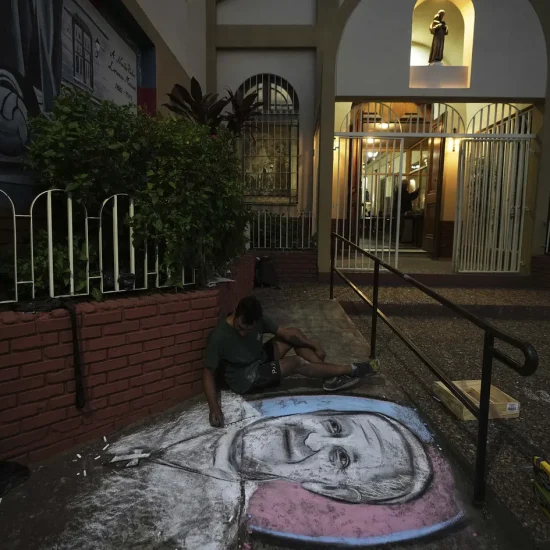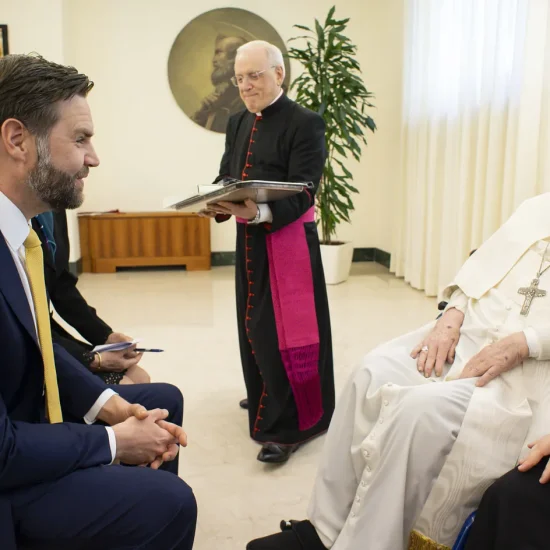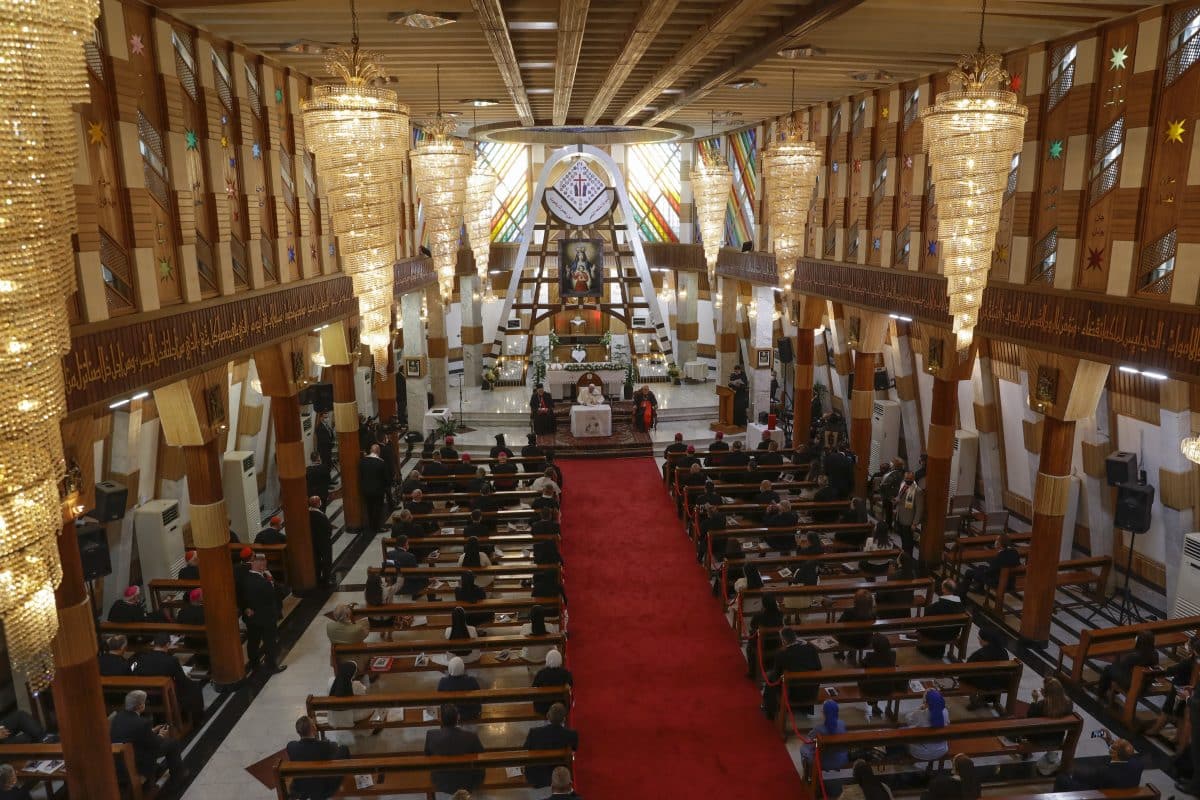
(RNS) — Standing in the Assyrian Catholic cathedral in Baghdad where 50 worshippers, clergy, and policemen were killed in a 2010 terrorist attack, Pope Francis on Friday made an appeal for “forgiveness, reconciliation, and rebirth” in the struggling Middle Eastern nation.
“We are gathered in this Cathedral of Our Lady of Salvation, hallowed by the blood of our brothers and sisters who here paid the ultimate price of their fidelity to the Lord and his Church,” Francis said, calling for Christians to be inspired by their sacrifice. “For Christians are called to bear witness to the love of Christ in every time and place. This is the Gospel that must be proclaimed and embodied in this beloved country as well.”
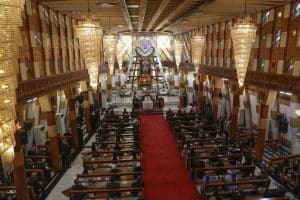
Pope Francis delivers his speech during a meeting with bishops and priests, at the Sayidat al-Nejat (Our Lady of Salvation) Cathedral, in Baghdad, Iraq, on March 5, 2021. (Andrew Medichini/Associated Press)
Francis’s visit to the cathedral set the tone for his historic visit (March 5-8), the first time a pope has set foot in the country, with an emphasis on Christian unity and tolerance in Iraq.
On Oct. 31, 2010, a group of at least six jihadists tied to Al-Qaeda stormed the large wooden doors of the Assyrian Catholic Cathedral around 6 p.m., just as the congregation gathered for Sunday Mass. After herding the nearly 100 worshippers into the center aisle, the attackers turned off the lights and fired on the crowd. Markings on the floor of the nave show where the 48 people who died fell.
The attack was condemned by political and religious leaders, including Sunni and Shiite representatives, around the world, and the church became the symbol of anti-Christian persecution in the Middle East.
“Their deaths are a powerful reminder that inciting war, hateful attitudes, violence or the shedding of blood are incompatible with authentic religious teachings,” the pope said on Friday. “I also want to remember all the victims of violence and persecution, regardless of the religious group to which they belong.”
Francis was welcomed at the cathedral by His Beatitude Ignatius Ephrem Joseph III Yonan, the Syriac Catholic Patriarch of Antioch and all the East of the Syriacs, and by His Beatitude Louis Raphaël Sako, the Patriarch of Babylon of the Chaldeans and head of the Chaldean Catholic Church. A dozen disabled Iraqis also greeted the pontiff in the square in front of the cathedral.
Inside the church, Francis spoke to local bishops, priests, clergy, seminarians, and catechists.
The pope’s visit, which some have criticized as too risky given Iraq’s political uncertainty and a recent spike in COVID-19 cases, was welcomed by the Iraqi people, Sako said.
“Your fatherly visit gives us the strength to overcome adversity, it reassures us that we are not forgotten, and generates trust and enthusiasm in us to continue our journey of faith and of evangelical witness, despite the difficulties,” he said.
In his speech, Francis rallied Christians against the challenges of the pandemic. While it’s easy “to be infected by the virus of discouragement,” he said, “the Lord has given us an effective vaccine against that nasty virus.”
The pontiff compared Iraq’s rich mix of faith and cultures to the threads of a carpet, one created by God, who is constantly mending it.
“How important is this witness of fraternal union in a world all too often fragmented and torn by division!” Francis said. “Every effort made to build bridges between ecclesial, parish and diocesan communities and institutions will serve as a prophetic gesture on the part of the Church in Iraq and a fruitful response to Jesus’ prayer that all may be one.”
Francis’s words echoed his remarks earlier that day to Iraqi President Barham Salih and local civil and diplomatic authorities. Referring to the havoc wreaked in Iraq over the past two decades, the pope said, “I come as a penitent, asking forgiveness of heaven and my brothers and sisters for so much destruction and cruelty.”
Francis emphasized peace and reconciliation as the cornerstone of the future of democracy and justice in Iraq and underlined the commitment of Catholic charitable organizations operating in the country. He asked that religious minorities, who often face legal discrimination in Iraq, “be integrated in society as citizens with full rights, freedoms and responsibilities.” The pope also specifically mentioned the Yazidis, an ethnic minority in Northern Iraq that was nearly destroyed by a genocide in 2014 by occupying Islamic State group forces.
“The religious, cultural and ethnic diversity that has been a hallmark of Iraqi society for millennia is a precious resource on which to draw, not an obstacle to be eliminated,” the pope said. “Iraq today is called to show everyone, especially in the Middle East, that diversity, instead of giving rise to conflict, should lead to harmonious cooperation in the life of society.”


